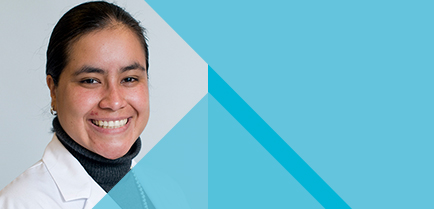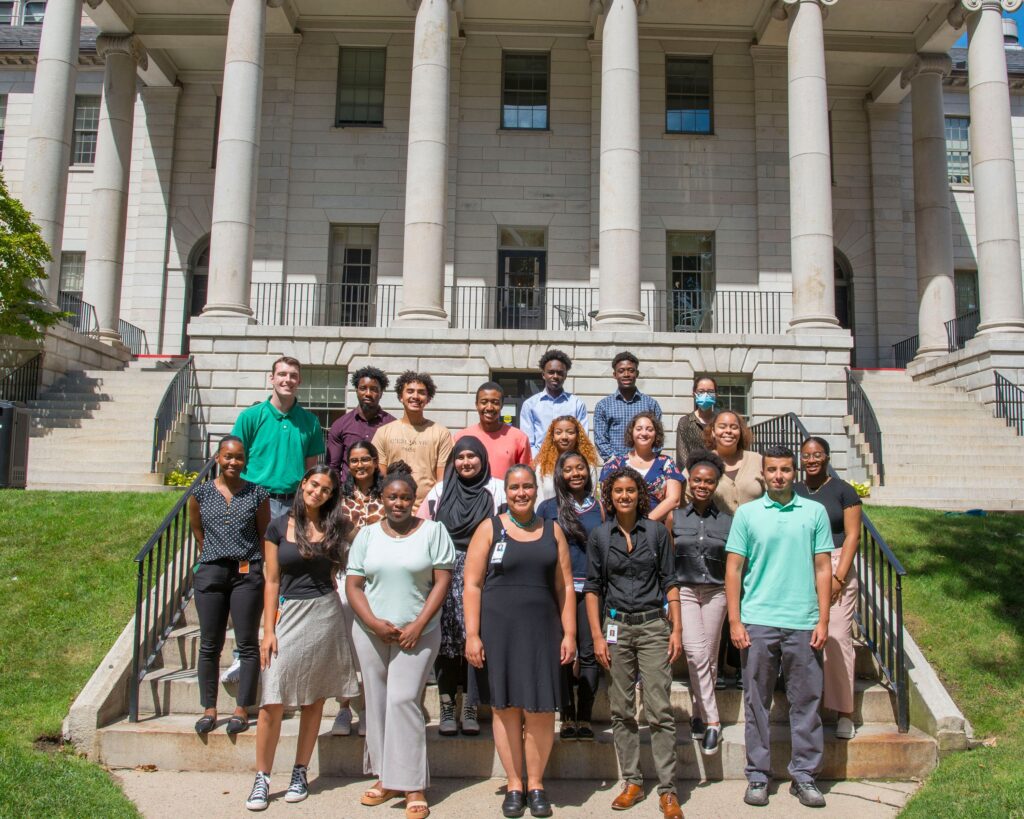Born in Guatemala to a Salvadorian father and Mexican mother, Nicte and her family moved to Mexico when she was seven to escape Guatemala’s political instability. The family eventually relocated to Michigan and then back to Mexico. “Everywhere we lived, there was this constant imbalance of inequity. Poverty and its effects, including the disparities in healthcare, were evident to me from a very young age. So, growing up, I thought I wanted to be a lawyer to help people.”
A standardized high school test proved otherwise. “Late in high school, we were required to take an aptitude test. The results showed that I should think about a career in medicine. I had never really thought about being a doctor. I don’t like needles, and I’m afraid of blood. But, the son of my mom’s coworker was going to medical school. He invited me to shadow him in the ER one night, and the experience transformed my path.”
Nicte applied and was accepted to the Monterrey Institute of Technology in Mexico.
She was initially drawn to pediatrics but changed course after shadowing a neurologist. “In Mexico, you go from high school to medical school and don’t do undergrad. It’s six years plus a year of community service. For four of those years, I wanted to be a pediatrician. Then, during clinical rotations. I was matched with a neurologist to shadow him in clinic.”
Nicte immediately fell in love with neurology. She looked forward to neurology rounds and diagnosing patients and treatments. “One of my mentors said, if you want to be a neurologist, you should train in the U.S. I spent some time at Baylor College of Medicine in Houston, a month at Johns Hopkins, and a month at Mass General (MGH). I fell in love with MGH. I thought it was a wonderful place to learn, where people cared deeply about each other and their patients. It was clear that they always wanted to do whatever was best for patients and their families.”
After her time at MGH, Nicte returned to Mexico for a year of community service. “I was living inside a tiny community health center in a rural village overseeing the health of about 6,000 people. I was responsible for prenatal care, diabetes management, accident response, you name it. Working as a team with an amazing group of community health workers was critical. Some of my patients lived within walking distance, while others lived miles away without access to public transportation. My car couldn’t get through the terrain, so I had to ask the police to take me to the farms to see my patients.”
Nicte’s year of community service in Mexico solidified her commitment to community health and neurology. Back in Houston, Nicte worked as a clinical research coordinator at Baylor College of Medicine, studying Parkinson’s disease, Huntington’s disease, and other movement disorders. Before she could apply to a residency program in the U.S. she took the United States medical licensing exams. She applied to MGH and was very excited to be invited to be part of the neurology program.
It didn’t take long for Nicte to realize that health disparities exist even in Massachusetts, where most people have access to health insurance. “Coming from Mexico and having lived in Guatemala, I thought there would be much better access to resources in the U.S. But that was far from the truth. Meeting people whose neurologic problems are occurring in the context of injustice is a constant reminder of why we need to advance health equity. As a trainee and even now as a faculty member, I have met people who experienced delays in their Parkinson’s disease diagnosis because of structural biases related to their gender, age, or the color of their skin. It’s been heartbreaking to witness patients without health insurance seizing uncontrollably in the ER because they couldn’t afford their medications for epilepsy. I’ve also encountered patients with poorly managed diabetes or hypertension who were having their second or third stroke because they hadn’t been offered a glucometer or blood pressure cuff to have a more active role in improving their health. Often, these patients navigated our healthcare system speaking languages other than English, with rare opportunities for care by clinicians who spoke their language, and gaps in access to professional medical interpreters.”
As a resident at MGH, Nicte began thinking about transitioning from helping one person at a time in a clinic to eliminating inequities across the entire system and beyond the walls of hospitals. “I did a lot of reading and came across the field of health disparities and health equity. I went to Dr. Anne B. Young, the Chief of Neurology at the time, and said I want to work at the intersection of neurology and public health. Anne was 100% supportive. MGH is an extraordinary place where, if you dream about it, you know there’s a way to make things happen. I enrolled at the Harvard School of Public Health, which led to my first grant and eventually the Rappaport Fellowship.”
Rappaport Fellowship
When Nicte began her Rappaport fellowship, little was known about health inequities and neurology. She focused her research on access to therapeutics such as deep brain stimulation for Parkinson’s disease. Her data showed that Black and Latino patients were about ten times less likely to have access to deep brain stimulation than white patients.
“This data started me thinking of structural racism and the pathways that create these inequities. Is it access to a neurologist? I had a clinic at Cambridge Hospital, and I thought, I’m working in a community hospital as a movement disorders expert. It’s going to be easier to connect someone who needs brain stimulation to the therapy. But there are so many variables in that specific scenario that prevent this from happening seamlessly. There were gaps in the treatment selection process, such as lack of access to neuropsychologic testing in a patient’s language, and there wasn’t a neurosurgeon offering the procedure at the hospital, requiring patients to go from one system to another. As simple as that sounds, and as close as MGH and Cambridge Hospital are, they are different worlds, and so there were all sorts of barriers that got in the way of people receiving proper and timely care.”
While Nicte believes it’s essential to put a number to problems and highlight disparities, she knows taking action is also important.” We know that there are problems. How can we tackle them? How can we be part of the solution within hospitals and clinics?
One way Nicte addresses these disparities is by recruiting and training future generations of neurologists from diverse backgrounds through the MGH Youth Neurology Education and Research Program. “We offer paid opportunities to conduct mentored research across MGH neurology labs to Massachusetts high school and undergraduate students from backgrounds underrepresented in neurology. It’s been a joy to employ these students during the summer and see them thrive as they develop research projects. Then the most important part that it’s just the start of a longer-term relationship. After the summer, my team and I keep connected with the students. We now have a network of 88 alumni who predominantly identify as female or non-binary, Black, Latino, or Native American. They are the first in their families to pursue higher education. Many are immigrants.”
“We support alumni as they apply to college and graduate school and are constantly helping them connect with part-time jobs during the school year or full-time jobs when they graduate. In 2023, the program had three times more applicants than in 2022. There’s a lot of interest, there are so many excellent students. So, part of the need is increasing the number of spots in our program. Part of the need is also better support of the alumni network. I’d love to recruit a licensed social worker to our team to be “
Nicte’s Pioneering Work in Health Equity is Getting Noticed
Nicte has been invited to teach health professionals through invited grand rounds, CME courses, and presentations, including at the American Academy of Neurology Annual Meeting, the American Neurological Association Annual Meeting, the International Parkinson and Movement Disorder Society International Congress, the Physicians for a National Health Program annual meeting, and the National Institutes of Health.
She served as the inaugural editor of the ‘Ideas’ section of the Neurology Journal, the largest and most prestigious neurology publication. This section is focused on inclusion, diversity, equity, and social justice.
She is an inaugural recipient of The Audrey S. Penn Lectureship Award, provided to American Neurological Association members who conduct outstanding research, program-building, or educational scholarship




